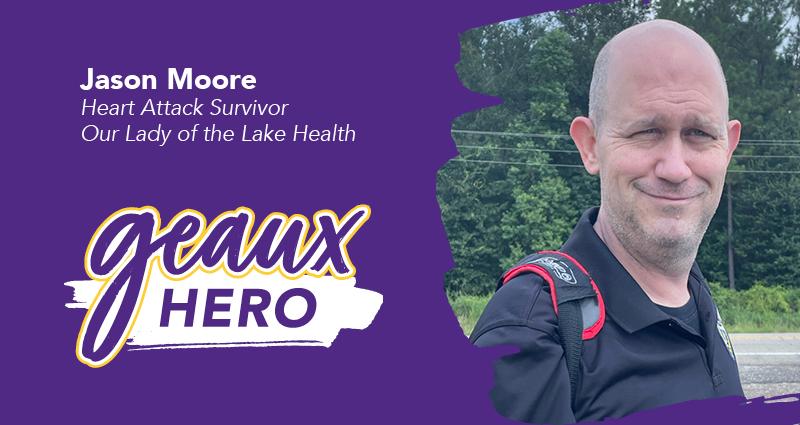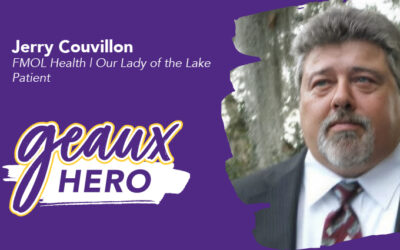Sometimes, how we healthcare is the strength of a community that never stops caring.
On an ordinary Saturday evening, Jason Moore walked into work at Our Lady of the Lake Regional Medical Center, just like he had countless times before. As a security guard assigned to the night shift, Jason took pride in keeping the hospital safe for patients, visitors and staff.
But that evening was different: Jason had been feeling off during his shift. His co-worker and longtime friend, fellow security guard Mark McKee, remembers getting a text from him mid-shift: “I’m not feeling well. I’m going to sit in the office.”
When Mark went to check on him about an hour later, what he found stopped him cold.
“I saw two feet sticking out from behind the counter,” Mark recalls. “He was purple. I checked for a pulse — nothing. I called a code blue and started CPR right there. I just kept thinking, ‘You’re not going out like this. Not today.’”
Within minutes, nurses and doctors arrived, taking over life-saving efforts, and Jason was rushed to the Emergency Department.
It wasn’t until the next day when Mark got an update from his director: Alone in the breakroom, Jason had a heart attack and collapsed. His heart stopped beating for about nine minutes before Mark came to check in on his friend and call the code blue. Using a defibrillator and continuing to do chest compressions, doctors were able to get a pulse, and Jason was moved to intensive care.
“All we had was a pulse and a prayer,” Mark recalls. “And I thought we can work with that.”
A Family’s World Turned Upside Down
Back at home, Jason’s wife, Sabrina, was enjoying a quiet morning with their two children when her phone rang.
“Mark called me and said I needed to get to the hospital,” she says. “When I asked what was wrong, he told me they found Jason and that he had no pulse. My heart just dropped. I didn’t know if I’d ever see him alive again.”
The drive to the hospital felt endless. Sabrina says all she can remember is her shaking and praying for her husband to be OK.
“I kept praying, ‘God, please don’t take him. Please let him come back to us,’” she recalls.
When she arrived, doctors had stabilized Jason, but he was on life support.
“Seeing him lying there with tubes everywhere, it didn’t even look like him,” Sabrina says. “The nurses kept telling me they were doing everything they could, but all I could think was, what if I have to tell my kids their dad isn’t coming home?”
For days, Sabrina lived in a fog of uncertainty. She barely left the hospital, unable to leave her husband’s side. The hospital staff made sure she had food, blankets and reassurance when she needed it most, supporting her as much as they cared for Jason.
A Hospital Family Rallies
For Jason, in addition to being the place where he worked, Our Lady of the Lake became a home to a network of people who cared about him as one of their own.
“When Jason went down, it felt like the whole hospital stopped,” Mark says. “People from every department were checking in, asking how he was doing. It wasn’t just another patient to them. He was family.”
Sabrina felt that same sense of belonging from the very first day. The hospital embraced her family with compassion and support — doctors and nurses provided constant updates, staff brought meals, and they even assisted the family with parking.
Sabrina says the nurses who cared for Jason during those critical first days went above and beyond to keep him engaged. They would stay with him, get him to move and even tickle his feet to see if he’d respond, which made Sabrina laugh during those dark times.
“They didn’t give up on him, and neither did anyone else here,” she says.
Rebuilding Body and Mind
When Jason was stable enough, he was transferred to the hospital’s inpatient rehabilitation unit, where Martin Setliff, MD, and his team took over.
“When Jason arrived, he couldn’t walk, feed himself or even sit on the edge of the bed without support,” Dr. Setliff says. “He had all his old memories, but he couldn’t create new ones. Each day was like starting over. Our goal was to help him regain the strength and skills he needed to return home.”
Progress came in baby steps.
“I always tell patients, I don’t need you to be perfect tomorrow,” Dr. Setliff explains. “I just need you to be a little better each day. Jason worked hard, and his family’s optimism made all the difference. The more hope a patient has, the better their chances for recovery.”
Sabrina was there for every therapy session, cheering him on and celebrating each small victory. She says she cried the first time he fed himself again because that small step showed her that her husband was coming back.
After weeks of physical, occupational and speech therapy, Jason began walking again. He regained control of his movements and started remembering day-to-day events. His personality returned, too.
“He likes to joke and aggravate,” Sabrina says with a laugh. “Now that he’s home, he’s already wanting to grill and even do laundry. It’s like having him back again.”
A Triumphant Exit
Two months after collapsing at work, Jason walked out of Our Lady of the Lake in May to cheers and applause from hospital staff, co-workers and friends who had followed his journey.
“When I saw him walk out of this hospital, it was truly a miracle,” Sabrina says. “Seeing the joy on everyone’s faces — people who fought for his life — it meant everything.”
Mark, Jason’s co-worker and friend who saved him that first morning, stood proudly among the crowd. “It makes me understand why we do what we do,” he says. “Here, the end result is people going home to their families. Watching Jason walk out alive … that’s why we’re here.”
For Dr. Setliff, moments like this are the heart of his work. “To see Jason, who came to us unable to do anything for himself, walk out under his own power surrounded by love — it’s why we do this. It’s what healing looks like.”
Back to the Life He Loves
Today, Jason is exactly where he wants to be: at home, grilling in the backyard with his dogs by his side.
He may not call himself a fighter, but his quiet strength tells another story. Discharged to the triumphant notes of the Rocky theme, Jason walked out of the hospital and into the life he fought so hard to return to.
Now, he has one simple message: gratitude. “Thank you to everyone that came out and saw me,” he says. “It’s nice to have people there that are doing stuff for you that you can’t see. And it’s really good. I really appreciate it.”




